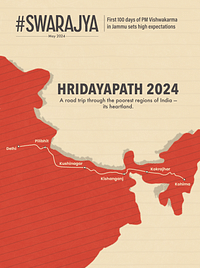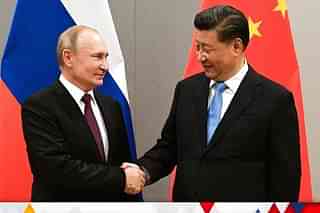News Brief
Outrage On Social Media Over TikTok Video Showing Singaporeans’ Distaste At Being Called 'Chinese'
Kuldeep Negi
May 13, 2024, 03:04 PM | Updated 03:04 PM IST
Save & read from anywhere!
Bookmark stories for easy access on any device or the Swarajya app.

A widely shared video on Chinese social media app TikTok has ignited an online debate concerning the national and ethnic identities of Singaporeans, particularly those of Chinese descent.
The clip, posted by a user claiming to be from China, captures his surprise when a Singaporean reacted negatively to being called a "compatriot" of mainland China.
The video, which garnered over 143,000 views and 1,600 comments in just three days, highlights the complex interplay of cultural identity and national sovereignty.
The user, identified only as "The Singaporean Son," shared an encounter where a Singaporean citizen vehemently denied any shared national identity with China, emphasising his Singaporean nationality.
“Little did I know, the Singaporean’s face turned black. ‘Since when are we compatriots? I’m Singaporean, not Chinese.’ I was stunned after that. Thereafter, I stopped saying such stuff," the user claimed.
This incident underscores the prevalent confusion and emotional responses associated with the conflation of Singaporean and Chinese identities.
Leong Chan-Hoong, a senior fellow for social cohesion research at Singapore's Nanyang Technological University, noted that the misconception of Singapore as part of China is not uncommon, especially among Western and North American societies.
He explained that this confusion stems from the significant ethnic Chinese majority in Singapore, which often leads to mistaken assumptions about the country's political and cultural affiliations.
This debate was further fuelled by another TikTok video showing a Chinese tourist in Singapore criticising the locals for their lack of Mandarin proficiency and the absence of Chinese signage on public transport.
This video clip sparked an uproar on social media, with users pointing out that English was the lingua franca in Singapore.
Sim Ann, Senior Minister of State in Singapore's Ministry of Foreign Affairs, addressed the nuanced relationship between Singapore and China in parliament last April.
She stressed that while cultural ties have enriched bilateral relations, they should not overshadow the fact that Singapore is an independent nation with its own unique multicultural identity.
These discussions are part of a broader context in which Singaporean identity is continuously negotiated and redefined, particularly in relation to its larger neighbor, China.
The recent questioning of TikTok CEO and Singaporean national, Chew Shou Zi, by US lawmakers over his alleged ties to the Chinese Communist Party further complicates this discourse, reflecting the geopolitical tensions that often colour these identity debates.
Video clips of the exchange between US lawmakers and the TikTok CEO went viral, with Singaporeans most incensed by the way Chew was questioned on his nationality and affiliations with the Chinese government.
“Singapore’s Chinese values or heritage is also different from that of [China], because Singaporeans have a more distinctive multicultural contour and we live in Southeast Asia – a multicultural area – and it is a lot more inclusive, given to our regional exposure to different races and group," Leong said, SCMP reported.
Singapore established diplomatic ties with China in October 1990, only after Indonesia had done so, in a bid to avoid giving its Southeast Asian neighbours the false impression that Singapore was a “Third China” in the region, a perception that it has tried to distance itself from since the Cold War era.
Bilateral ties between Singapore and China normalised when Beijing opened up in the late 1970s and stopped supporting communist movements in the region.
Over the past decade, China has been Singapore’s largest trading partner and the city state has been Beijing’s largest foreign investor, according to information on Singapore’s Ministry of Foreign Affairs website.
China was the top recipient of investment from Singapore in 2021, with S$195.5 billion (US$145 billion) invested.
Save & read from anywhere!
Bookmark stories for easy access on any device or the Swarajya app.
Kuldeep is Senior Editor (Newsroom) at Swarajya. He tweets at @kaydnegi.
Support Swarajya's 50 Ground Reports Project & Sponsor A Story
Every general election Swarajya does a 50 ground reports project.
Aimed only at serious readers and those who appreciate the nuances of political undercurrents, the project provides a sense of India's electoral landscape. As you know, these reports are produced after considerable investment of travel, time and effort on the ground.
This time too we've kicked off the project in style and have covered over 30 constituencies already. If you're someone who appreciates such work and have enjoyed our coverage please consider sponsoring a ground report for just Rs 2999 to Rs 19,999 - it goes a long way in helping us produce more quality reportage.
You can also back this project by becoming a subscriber for as little as Rs 999 - so do click on this links and choose a plan that suits you and back us.
Click below to contribute.








